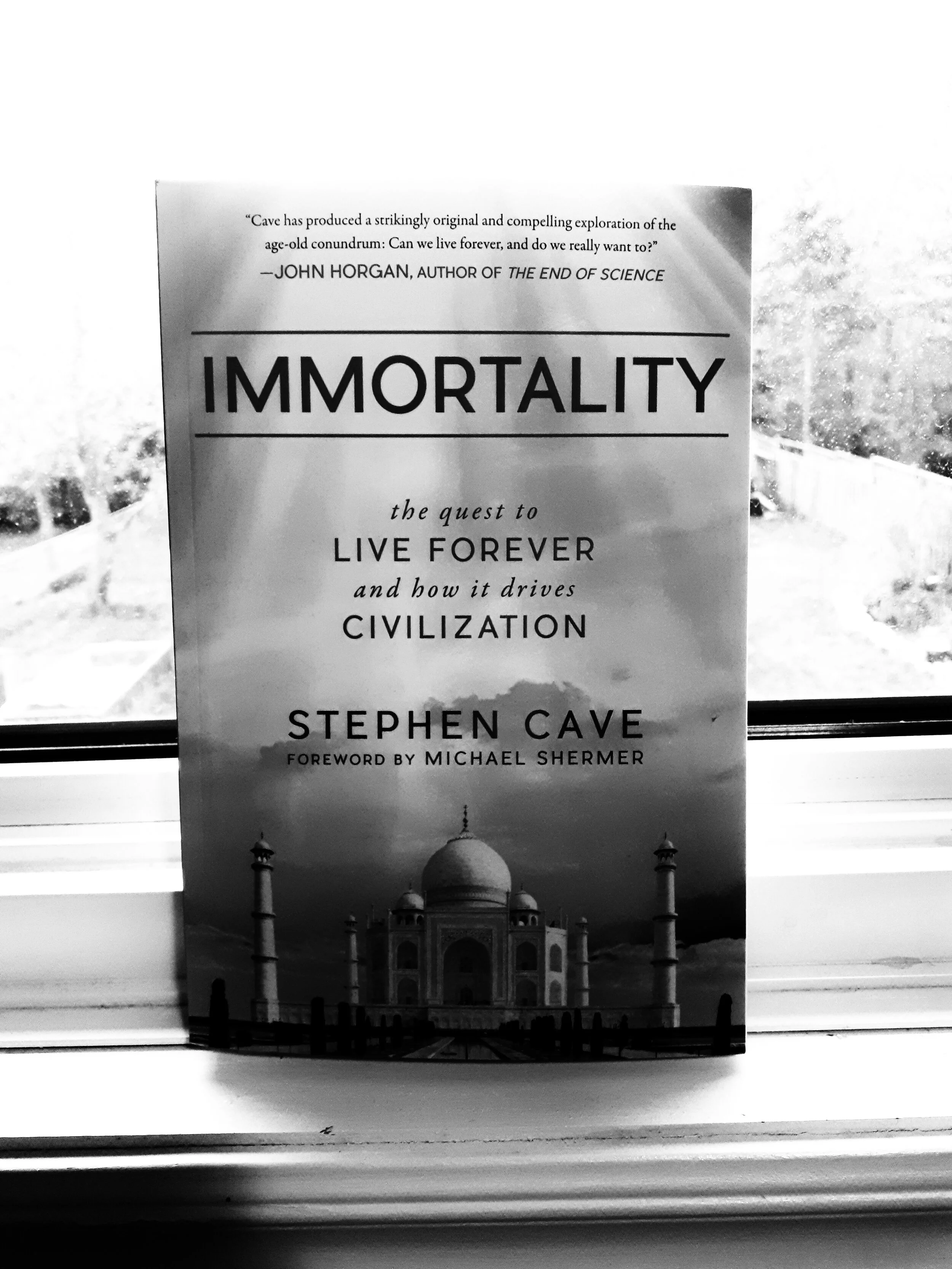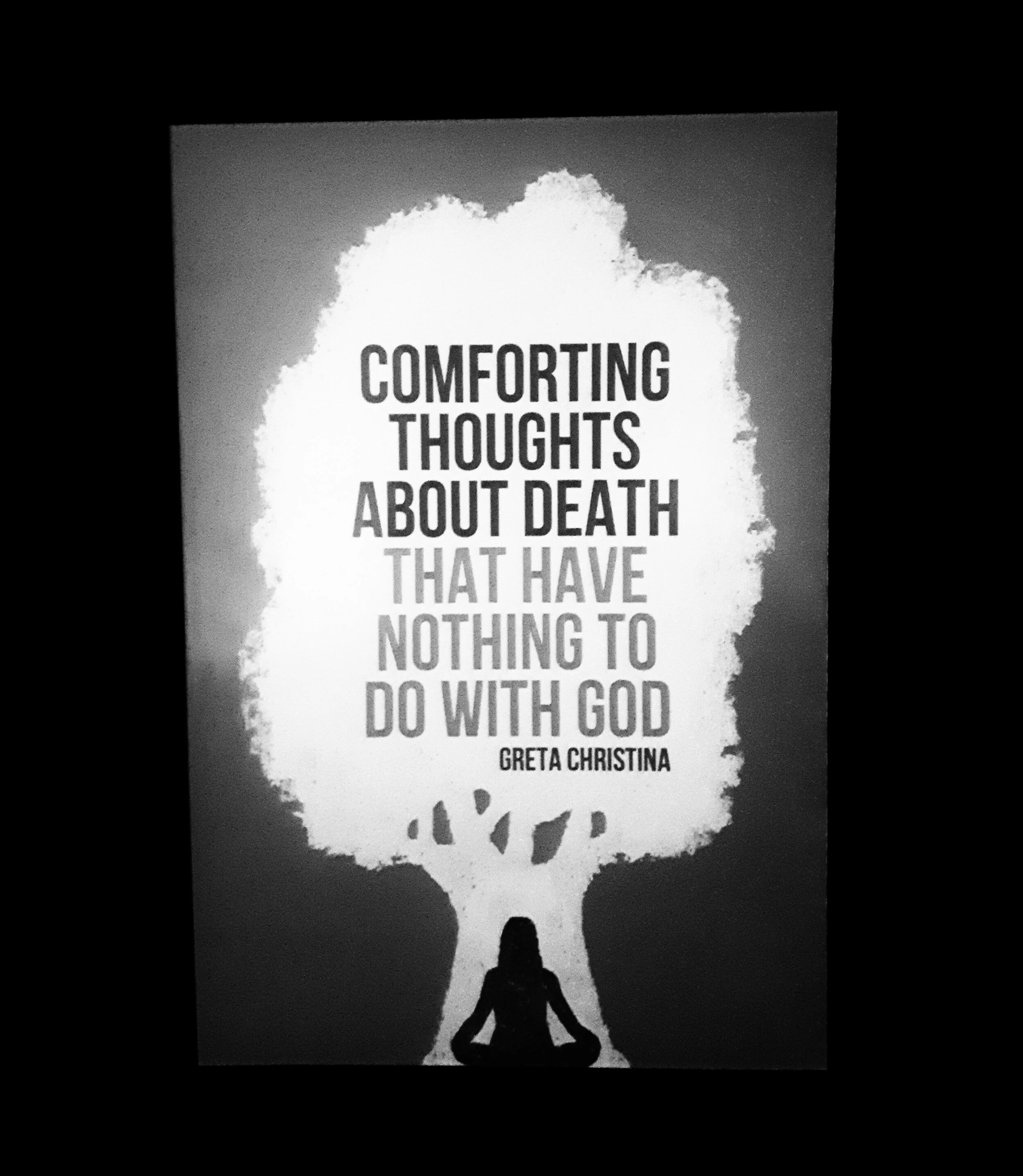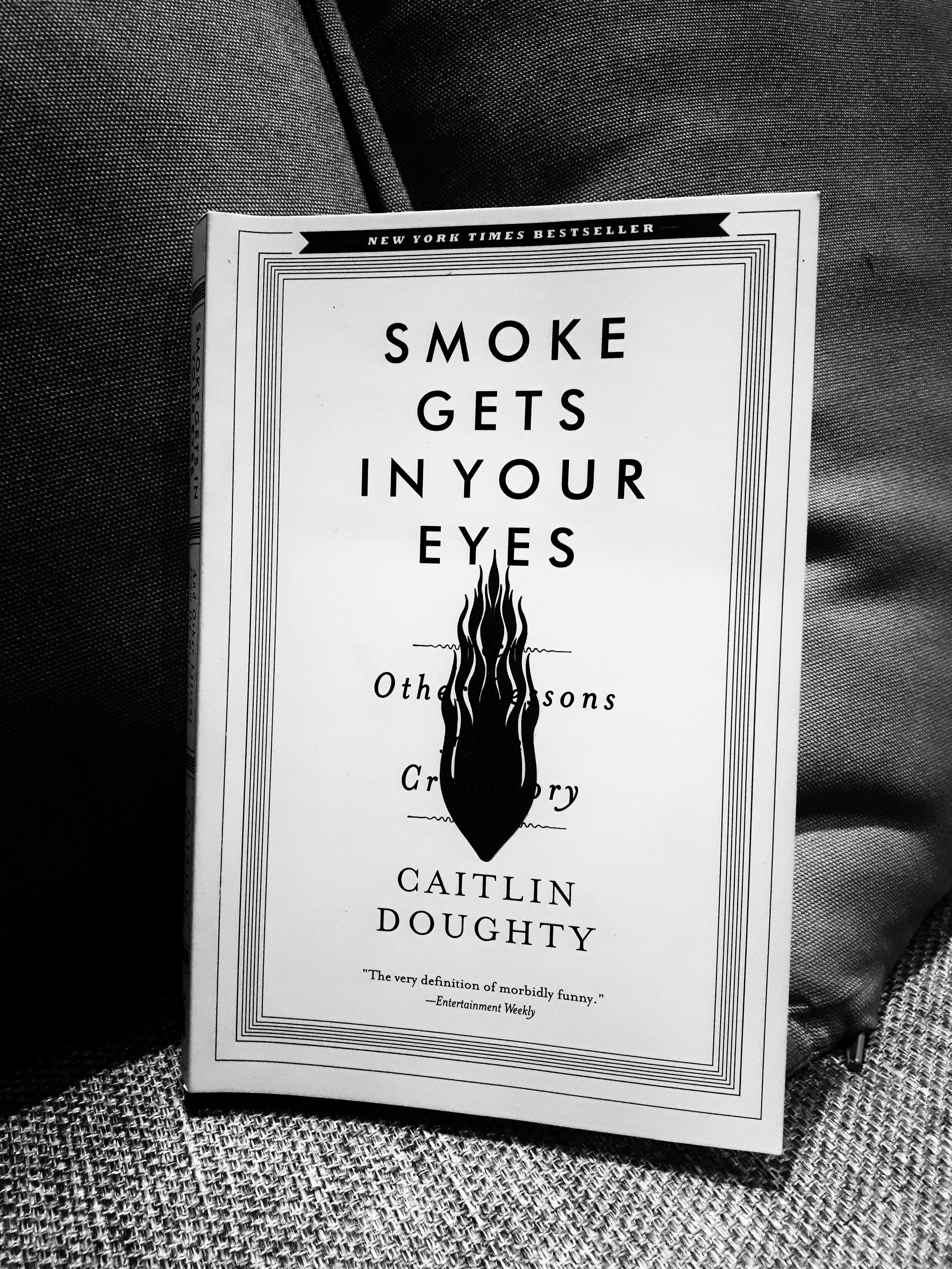10 Books about Death for Atheists
Looking for non-religious books on death, dying, and mortality? Here are 10, all written by atheists/agnostics.
1. Mortals: How the Fear of Death Shaped Human Society (Rachel and Ross Menzies)
“Humans have an extraordinary capacity to look forward and plan for harmful potentialities. This is the power of our reflective consciousness. But it comes with a curse. If we are capable of seeing the paths ahead of us, perhaps better than any species that has ever lived on our planet, at some point we must realise where all paths are leading – to the grave.”
While you may think that you don’t suffer from death anxiety (you do), or that death anxiety doesn’t influence your behaviour (it does), the (scientifically demonstrable) truth is that our dread of death affects everything. It impacts our relationships, the number of children we have, how fast we drive, how much we exercise, and our propensity toward religious belief. Remind people they’re going to die, and you can change everything from the amount of sunscreen they wear to their beliefs about immigrants and minorities. In Mortals, Rachel and Ross Menzies explore the warp and weft of existential dread and all its fascinating consequences.
2. This Life: Secular Faith and Spiritual Freedom (Martin Hägglund)
“From a religious perspective, a life that ends in death is meaningless and without purpose. For life to have meaning and purpose, it must ultimately be grounded or absorbed in something that is infinite – something that will never die. My argument is, on the contrary, that any purpose of life depends on the prospect of death. . . Life can only matter in the light of death.”
Sure to scandalize theists and atheists alike, Martin Hägglund’s This Life (alternate title: How Mortality Makes Us Free) argues that only people with a secular perspective on death can truly engage topics of meaning, morality, and value. Far from the global party line, which is that religion maintains a monopoly on these questions (and answers), Hägglund argues not that a secular perspective can contribute to these conversations, but that only a secular perspective makes sense. Astoundingly, he argues most of his secular positions using religious texts. If you’re ready for a deep philosophical dive into the necessity of mortality, give this one a read.
“The silence that is death, my not being there any longer, is something else again. It seems to resist thought. It is a wall my mind runs up against without being able to penetrate or find its way around. It confronts me, not as a threat to my being (things are already too late for that), but as an incomprehensibility that nevertheless is who I am to become.”
Speaking of atheist philosophers, Todd May’s Death explores what death is (and isn’t) for non-believers, and why it’s so difficult to live with both the uncertainty and inevitability of death hanging over us. Like Hägglund, May believes that mortality is necessary to make living worthwhile, but he also believes that death is what threatens life with meaninglessness. For May, the fragility of our lives both makes and unmakes the importance of them. Without our death, life would be devoid of meaning, but with death we wonder “what’s the point?” Death explores the philosophical paradox: “what do we make of ourselves if the death that undermines us is a necessary feature of our lives being worthwhile?”
4. Staring at the Sun: Overcoming the Terror of Death (Irvin Yalom)
“Many of us commingle anxiety about death with the fear of evil, abandonment, or annihilation. Others are staggered by the enormity of eternity, of being dead forever and ever and ever and ever; others are unable to grasp the state of nonbeing and ponder the question of where they will be when they are dead; others focus on the horror of their entire personal world vanishing; others wrestle with death’s inevitability.”
Staring at the Sun by Irvin Yalom takes us out of philosophy and into psychology. Yalom is an existential psychologist, someone who specializes in anxiety over death, isolation, and meaninglessness. Because he’s also an atheist, this book is full of the most relevant advice for any non-believer grappling with mortal terror. There are precious few gems that exist in this niche space, but Staring at the Sun is definitely one.
5. Nothing to Be Frightened Of (Julian Barnes)
“It is difficult for us to contemplate, fixedly, the possibility, let alone the certainty, that life is a matter of cosmic hazard, its fundamental purpose mere self-perpetuation, that it unfolds in emptiness, that our planet will one day drift in frozen silence, and that the human species, as it has developed in all its frenzied and over-engineered complexity, will completely disappear and not be missed. . . And it is a frightening prospect for a race which has for so long relied upon its own invented gods for explanation and consolation.
[Theists say:] believe in what I believe – believe in God, and purpose, and the promise of eternal life – because the alternative is f***ing terrifying.”
Looking for a non-believer who has spent a considerable amount of time contemplating his own personal annihilation and is scared shitless by oblivion? You’ve found him! Julian Barnes has given you a title that may lull you into a false sense of security (“ah, here is someone who has comforting things to say!”), but don’t be fooled… Nothing to Be Frightened Of is really NOTHING to Be Frightened Of. Full of dark, irreverent humour, this book is basically one long drawn-out scream of terror.
6. Immortality: The Quest to Live Forever and How It Drives Civilization (Stephen Cave)
“At its core, civilization is a collection of life-extension technologies.”
Homo sapiens is the only species that has a sense of self and that can conceptualize the future, and we are therefore the only species that can understand that the will to live is ultimately thwarted. And so, we seek out belief systems that permit us to believe we will endure. In Immortality, Stephen Cave explores how our desire to evade death and live forever has shaped society, including the four Immortality Narratives that have been surfacing since time immemorial (and, critically, why they are all intellectually dishonest).
7. Dying: A Memoir (Cory Taylor)
“For this is one of the most lamentable consequences of our reluctance to talk about death. We have lost our common rituals and our common language for dying, and must either improvise, or fall back on traditions about which we feel deeply ambivalent. I am talking especially about people like me, who have no religious faith. For us it seems that dying exposes the limitations of secularism like nothing else.”
Cory Taylor was an award-winning Australian writer who died from melanoma-related brain cancer at 61. She wrote Dying: A Memoir in the space of a few weeks. There aren’t many memoirs written by terminally ill atheists (Mortality by Christopher Hitchens perhaps being the best known), but this slim volume is beautifully written and sure to resonate with other non-believers. The very beginning and end of this memoir is where you’ll get Taylor’s thoughts on death and mortality, the middle section being dedicated mostly to her thoughts on family and childhood.
8. Comforting Thoughts About Death That Have Nothing to Do with God (Greta Christina)
“When I believed in an afterlife, I always had a nagging, uncomfortable feeling in the back of my mind that my beliefs weren’t based on anything substantial, that they weren’t sincere beliefs so much as wishful thinking. Compared to my current conclusions – that when we die, our consciousness will disappear entirely – I suppose those beliefs were more comforting.
Or they would have been, if it hadn’t been for my uneasy suspicion that they were bullshit.”
The content of this book is evident from the title: Comforting Thoughts About Death That Have Nothing to Do with God. Here, Greta Christina offers up plenty of secular consolations for any atheist upset by the prospect of their own personal extinction, and she disagrees with the common assumption that only religion can alleviate this angst. She implores her fellow atheists to abandon the assumption as well. If death anxiety is the last holdout of faith in a modern age, then we should make atheism a “safe place to land” by exploring what solace secular thinking can offer every anxious primate.
“We are, from a purely biological perspective, simply breathing pieces of defecating meat, no more significant or enduring than a lizard or a potato.”
The Worm at the Core is the book that launched a thousand ships (if ships were scientific experiments designed to uncover how death anxiety influences behaviour). This book, by researchers Solomon, Greenberg, and Pyszczynski, was the first to introduce Terror Management Theory, which posits that we defend ourselves against existential anxiety by reinforcing our own self-worth and by clinging to the rightness and safety of our cultural belief systems. These researchers were the first to demonstrate, experimentally, how death anxiety can inspire the worst in us – egotism, racism, xenophobia, you can conjure them all simply by reminding someone that they’ll die. Wild, right? Read this book not just for the jaw-dropping study results, but also for the colourful language the authors use (describing humans as “naked, pulsating pieces of fornicating finite species meat” and “transient ambulatory gene repositories” are personal favourites).
10. Smoke Gets in Your Eyes & Other Lessons from the Crematory (Caitlin Doughty)
“. . . I went from thinking it was strange that we don’t see dead bodies anymore to believing their absence was a root cause of major problems in the modern world. Corpses keep the living tethered to reality. . . No matter how much technology may become our master, it takes only a human corpse to toss the anchor off that boat and pull us back down to the firm knowledge that we are glorified animals that eat and shit and are doomed to die. We are all just future corpses.”
You may know Caitlin Doughty from her YouTube channel “Ask a Mortician,” but I know her as the atheist who wrote that death book that made me laugh so hard I cried. Smoke Gets in Your Eyes details Doughty’s experiences as a crematory assistant, complete with maggots, molten fat, bone blenders, body froth, and flesh-eating turtles. There are also terms like “bubblating,” which you can’t ever unlearn, and something called THE TOSS. I can’t even prepare you. To overcome death denial and all its cultural trappings we must talk about death, bring it out into the open, undo the stigma and taboo. Doughty’s favourite way to do this is to share the most delightfully morbid stories in her repository (and boy are there some doozies).
I hope you enjoy this list, future corpses. As Doughty would say: Vive la decay!
(Looking for fiction? Try Novels about Death)









